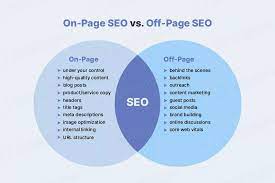Understanding Off-Page and On-Page SEO
Search Engine Optimization (SEO) is a crucial aspect of digital marketing that focuses on improving a website’s visibility in search engine results. There are two main components of SEO: On-Page SEO and Off-Page SEO.
On-Page SEO
On-Page SEO refers to the optimization strategies that are implemented on the website itself to improve its search engine ranking. This includes optimizing content, meta tags, headings, URLs, and images. By incorporating relevant keywords, creating high-quality content, and ensuring proper HTML markup, websites can enhance their on-page SEO.
Off-Page SEO
Off-Page SEO, on the other hand, focuses on external factors that impact a website’s search engine ranking. This includes building backlinks from reputable websites, social media marketing, influencer outreach, and online reputation management. Off-page SEO helps establish a website’s authority and credibility in the eyes of search engines.
Both On-Page and Off-Page SEO are essential for a comprehensive digital marketing strategy. While On-Page SEO lays the foundation by optimizing the website’s content and structure, Off-Page SEO complements it by building external relationships and increasing online visibility.
By incorporating both On-Page and Off-Page SEO techniques effectively, businesses can improve their search engine rankings, drive organic traffic to their websites, and ultimately increase their online presence.
Maximizing Your SEO: 6 Essential Tips for On-Page and Off-Page Optimization
- 1. Build high-quality backlinks from reputable websites to improve your site’s authority.
- 3. Submit your website to online directories and listings to enhance its online presence.
- 4. Guest posting on relevant blogs can help you reach a wider audience and build backlinks.
- 2. Create high-quality, valuable content that is optimized for both users and search engines.
- 4. Use internal linking to guide visitors through your site and improve overall user experience.
- 5. Ensure mobile responsiveness for seamless browsing experience on all devices.
1. Build high-quality backlinks from reputable websites to improve your site’s authority.
Building high-quality backlinks from reputable websites is a crucial strategy in Off-Page SEO that can significantly enhance your site’s authority and credibility. By establishing strong connections with trustworthy sources, you not only improve your website’s visibility in search engine results but also signal to search engines that your content is valuable and reliable. These backlinks act as endorsements for your website, boosting its reputation and ultimately driving more organic traffic to your site. Incorporating this tip into your SEO strategy can lead to long-term benefits and help elevate your website’s online presence.
3. Submit your website to online directories and listings to enhance its online presence.
Submitting your website to online directories and listings is a valuable strategy to boost its online presence through Off-Page SEO. By listing your website on reputable directories, you increase its visibility and credibility in the digital realm. This not only helps in attracting more traffic to your site but also improves its search engine ranking by establishing external links. Additionally, being listed on relevant directories can enhance your website’s authority within your industry or niche, ultimately contributing to a stronger online presence and increased brand recognition.
4. Guest posting on relevant blogs can help you reach a wider audience and build backlinks.
Guest posting on relevant blogs is a powerful strategy that can significantly boost your website’s SEO performance. By contributing valuable content to blogs within your niche, you not only expand your reach to a wider audience but also have the opportunity to earn high-quality backlinks. These backlinks from reputable sources can enhance your website’s authority and credibility in the eyes of search engines, ultimately improving your search engine rankings. Guest posting is a win-win approach that allows you to establish thought leadership, drive traffic to your site, and strengthen your off-page SEO efforts while building valuable connections within your industry.
2. Create high-quality, valuable content that is optimized for both users and search engines.
Creating high-quality, valuable content that is optimized for both users and search engines is a fundamental tip for effective Off-Page and On-Page SEO strategies. By focusing on producing content that is informative, engaging, and relevant to your target audience, you not only enhance user experience but also improve your website’s search engine ranking. Incorporating strategic keywords naturally within the content helps search engines understand the context of your website, making it more likely to appear in relevant search results. This dual approach of catering to both users and search engines ensures that your content is not only discoverable but also valuable to those who engage with it.
4. Use internal linking to guide visitors through your site and improve overall user experience.
Using internal linking is a valuable strategy in both On-Page and Off-Page SEO efforts. By strategically linking relevant pages within your website, you not only guide visitors through your site but also enhance the overall user experience. Internal linking helps search engines navigate your website more effectively, establishing a hierarchy of information and improving the site’s authority. This practice not only boosts SEO rankings but also keeps visitors engaged and encourages them to explore more content, ultimately leading to increased time spent on the site and higher chances of conversion.
5. Ensure mobile responsiveness for seamless browsing experience on all devices.
Ensuring mobile responsiveness is a critical aspect of both Off-Page and On-Page SEO strategies. With the increasing use of mobile devices for browsing the internet, having a website that is optimized for mobile provides users with a seamless browsing experience across all devices. Search engines also prioritize mobile-friendly websites in their rankings, making it essential for businesses to adapt their websites to be responsive and user-friendly on smartphones and tablets. By prioritizing mobile responsiveness, businesses can enhance their online visibility, improve user engagement, and ultimately boost their search engine rankings for better organic traffic results.

